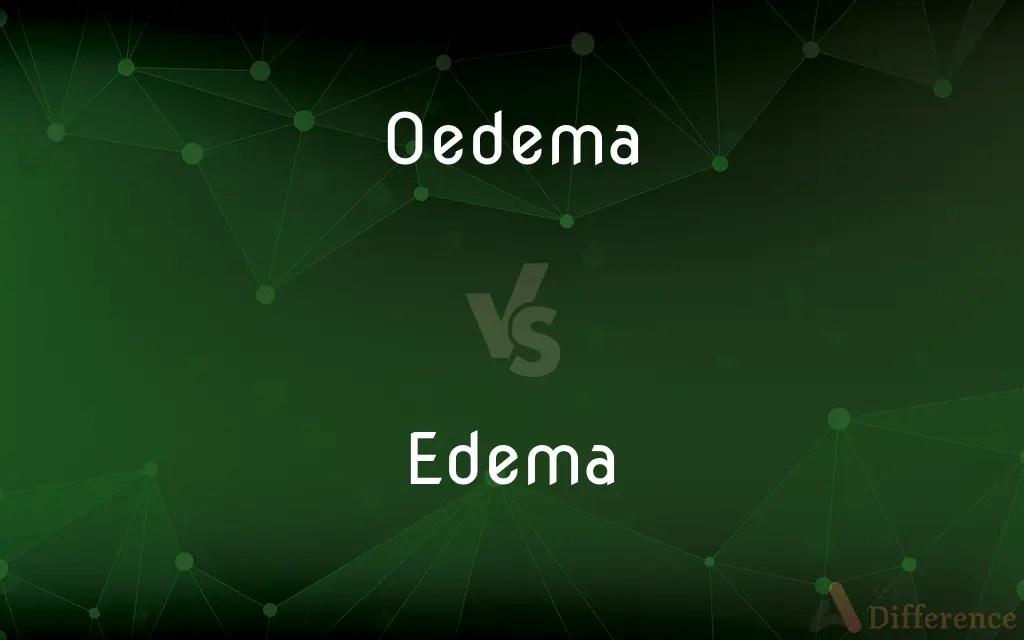Oedema vs. Edema — What's the Difference?
By Tayyaba Rehman & Urooj Arif — Updated on March 20, 2024
Oedema and edema refer to the same medical condition of fluid accumulation in tissues, but "oedema" is preferred in British English, while "edema" is used in American English.

Difference Between Oedema and Edema
Table of Contents
ADVERTISEMENT
Key Differences
Oedema is a term commonly used in British English to describe the swelling caused by excess fluid trapped in the body's tissues. This term is often found in medical literature and patient care instructions within the UK and other countries using British spelling conventions. On the other hand, edema is the American English variant of the same term, predominantly used in the United States and countries that follow American English practices in medicine and healthcare.
Both oedema and edema refer to the same physiological condition, where an abnormal accumulation of fluid in the interstitium, located just beneath the skin or in one or more cavities of the body, leads to swelling. This condition can be localized, affecting a specific part of the body, or generalized, affecting a larger area. While the terms are interchangeable in the medical community, their usage often depends on the regional spelling preferences.
The spelling differences between oedema and edema reflect broader differences between British and American English, not only in medicine but across the language. These differences can include the use of "oe" or "ae" in British English where American English uses "e", such as in "foetus" vs. "fetus" or "haematology" vs. "hematology". In both cases, the variations do not affect the pronunciation significantly.
Understanding whether to use oedema or edema can be important for medical professionals, researchers, and students who communicate with international colleagues or publish research in international journals. Choosing the appropriate term can help ensure clarity and prevent misunderstandings due to regional language differences.
Regardless of the spelling, the treatment for oedema/edema involves addressing the underlying cause of the fluid accumulation. This can range from simple measures like elevation of the affected limbs to more complex medical interventions depending on the severity and underlying cause of the condition. The choice of term has no bearing on the clinical approach to managing the condition.
ADVERTISEMENT
Comparison Chart
Spelling
Oedema
Edema
Preferred in
British English
American English
Pronunciation
Same for both: /ɪˈdiːmə/ or /əˈdiːmə/
Same for both: /ɪˈdiːmə/ or /əˈdiːmə/
Usage in Medicine
Common in the UK, Australia, and other regions using British English
Common in the US and other regions using American English
Relation to Language Standards
Reflects British English spelling conventions involving "oe" and "ae"
Reflects American English spelling simplifications
Compare with Definitions
Oedema
Abnormal accumulation of fluid in tissues.
After the bee sting, noticeable oedema developed around the site.
Edema
Swelling from fluid retention in body tissues.
Edema in her ankles worsened throughout the day.
Oedema
Can be symptomatic of various conditions.
Cardiac oedema can indicate heart failure.
Edema
Indicator of health issues.
Renal edema may suggest kidney problems.
Oedema
May manifest in specific body parts.
Pulmonary oedema affects the lungs, leading to breathing difficulties.
Edema
Localized or widespread.
He developed localized edema at the injection site.
Oedema
Treatment depends on the cause.
Diuretics are often prescribed for oedema to reduce fluid buildup.
Edema
Management varies by underlying condition.
Compression stockings are recommended for edema management.
Oedema
Often involves swelling.
The patient's legs showed significant oedema by the evening.
Edema
Characterized by puffiness.
Facial edema was evident in the morning.
Oedema
Variant of edema.
Edema
Edema, also spelled oedema, and also known as fluid retention, dropsy, hydropsy and swelling, is the build-up of fluid in the body's tissue. Most commonly, the legs or arms are affected.
Oedema
(British spelling) edema
Edema
(Medicine)An excessive accumulation of serous fluid in tissue spaces or a body cavity.
Oedema
A swelling from effusion of watery fluid in the cellular tissue beneath the skin or mucous membrance; dropsy of the subcutaneous cellular tissue.
Edema
(Botany)A condition of plants characterized by blisterlike swellings on the leaves or other parts, caused by an accumulation of water.
Oedema
Swelling from excessive accumulation of serous fluid in tissue
Edema
An excessive accumulation of serum in tissue spaces or a body cavity.
Edema
A similar swelling in plants caused by excessive accumulation of water.
Edema
Same as œdema.
Edema
Swelling from excessive accumulation of serous fluid in tissue
Common Curiosities
Is oedema different from edema?
No, oedema and edema refer to the same condition; the difference lies in the regional spelling preference.
What is oedema/edema?
Oedema (British English) or edema (American English) is the medical term for swelling caused by fluid accumulation in body tissues.
How do you pronounce oedema/edema?
Both oedema and edema are pronounced /ɪˈdiːmə/ or /əˈdiːmə/.
Are there different types of oedema/edema?
Yes, including pulmonary edema (lungs), peripheral edema (limbs), and cerebral edema (brain), among others.
Is oedema/edema treatable?
Yes, treatment usually involves addressing the underlying cause and may include medications and lifestyle changes.
Can oedema occur anywhere on the body?
Yes, oedema can be localized to a specific area or be more generalized.
What causes oedema/edema?
Causes can vary from simple reasons like standing for long periods to serious medical conditions like heart failure.
Does elevation help reduce oedema/edema?
Elevating the affected body part can help reduce swelling and discomfort associated with oedema/edema.
Can diet affect oedema/edema?
A high-salt diet can worsen oedema/edema by encouraging fluid retention.
What is lymphedema?
Lymphedema is a specific type of edema caused by a blockage in the lymphatic system, leading to swelling, often in the arms or legs.
What is pulmonary oedema/edema?
Pulmonary oedema is the accumulation of fluid in the lungs, which can interfere with breathing.
Is oedema/edema always a sign of disease?
Not always; it can also result from temporary conditions like sitting for too long or eating salty foods.
Can pregnancy cause oedema/edema?
Yes, it's common for pregnant women to experience mild oedema/edema, especially in the feet and ankles.
Share Your Discovery

Previous Comparison
Woman vs. Superwoman
Next Comparison
Monsoon vs. HurricaneAuthor Spotlight
Written by
Tayyaba RehmanTayyaba Rehman is a distinguished writer, currently serving as a primary contributor to askdifference.com. As a researcher in semantics and etymology, Tayyaba's passion for the complexity of languages and their distinctions has found a perfect home on the platform. Tayyaba delves into the intricacies of language, distinguishing between commonly confused words and phrases, thereby providing clarity for readers worldwide.
Co-written by
Urooj ArifUrooj is a skilled content writer at Ask Difference, known for her exceptional ability to simplify complex topics into engaging and informative content. With a passion for research and a flair for clear, concise writing, she consistently delivers articles that resonate with our diverse audience.
















































